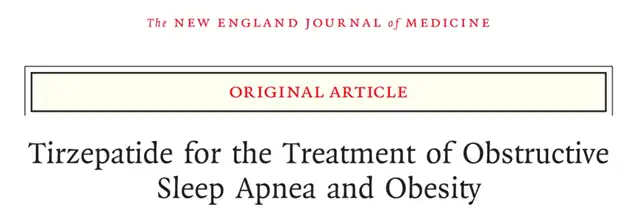Tirzepatide Completes Successful Phase 3 Trial for Sleep Apnea
- CDC Recommends Updated COVID-19 Vaccines for 2024-2025 Season
- Will China and India produce cheaper “Miracle Weight Loss Drug”Semaglutide soon?
- Keto Diet Accelerates Aging and Promotes Cancer Metastasis
- The Critical Role of Immune Cell Triumvirates in Enhancing CD8+ T Cell Function
- Chinese-made Drug Enters Australia: Causing at Least 20 Deaths!
- UV Rays Threaten Golfers’ Health: Sun Protection Strategies You Need to Know
Tirzepatide Completes Successful Phase 3 Trial for Sleep Apnea, Approval Expected
- Chinese-made Drug Enters Australia: Causing at Least 20 Deaths!
- How serious is Japan’s “flesh-eating bacteria” problem?
- Taiwan 6th wave of COVID outbreak: 623 confirmed cases in one week and 38 deaths
- FDA has mandated a top-level black box warning for all marketed CAR-T therapies
- Can people with high blood pressure eat peanuts?
- What is the difference between dopamine and dobutamine?
- How long can the patient live after heart stent surgery?
Tirzepatide Completes Successful Phase 3 Trial for Sleep Apnea, Approval Expected
Tirzepatide, the Most Potent Weight Loss Drug, Successfully Completes Phase 3 Clinical Trial for Treating Sleep Apnea, Expected to Gain Approval This Year.
Tirzepatide (Tizepatide), developed by Eli Lilly, is a dual agonist of the glucose-dependent insulinotropic polypeptide (GIP) receptor and the glucagon-like peptide-1 (GLP-1) receptor. It was approved by the FDA in November 2023 as a weight loss drug under the brand name Zepbound™. It was previously approved for lowering blood sugar in type 2 diabetes under the brand name Mounjaro™. Tirzepatide is currently the most effective weight loss drug on the market, consistently setting new records in clinical trials for weight loss efficacy.
On April 17, 2024, Eli Lilly announced positive results from their Phase 3 clinical trial, SURMOUNT-OSA. Compared to a placebo, tirzepatide (at doses of 10mg or 15mg) significantly reduced the apnea-hypopnea index (AHI), achieving both primary and key secondary endpoints, marking a successful trial.

The results of this clinical trial were published in the New England Journal of Medicine (NEJM) on June 21, in a paper titled “Tirzepatide for the Treatment of Obstructive Sleep Apnea and Obesity.”
This Phase 3, double-blind, randomized, controlled trial showed that in patients with moderate to severe obstructive sleep apnea (OSA) and obesity, tirzepatide significantly reduced the apnea-hypopnea index (AHI), body weight, hypoxic load, high-sensitivity C-reactive protein (hsCRP) levels, and systolic blood pressure, and improved sleep-related patient-reported outcomes.
The apnea-hypopnea index (AHI) measures the number of times per hour of sleep that a person’s breathing is restricted or airflow is completely blocked, used to assess the severity of obstructive sleep apnea (OSA) and the effectiveness of treatment.
In the SURMOUNT-OSA trial, doses of 10mg or 15mg were administered once weekly. The starting dose was 2.5mg, increasing by 2.5mg every four weeks until reaching the maximum tolerated dose. Participants who tolerated the 15mg dose continued with 15mg, while those who tolerated 10mg but not 15mg continued with 10mg.
SURMOUNT-OSA Study 1 evaluated the effects of 52 weeks of tirzepatide treatment in adults with moderate to severe OSA and obesity who were not receiving positive airway pressure (PAP) therapy. Efficacy assessments showed that after 52 weeks of tirzepatide treatment, patients’ AHI decreased by an average of 27.4 events/hour from baseline, compared to a 4.8 events/hour decrease in the placebo group. For key secondary endpoints, the mean AHI reduction from baseline was 55.0% in the tirzepatide group compared to 5.0% in the placebo group. Additionally, the tirzepatide group saw an average body weight reduction of 18.1% from baseline, while the placebo group saw a reduction of only 1.3%.
SURMOUNT-OSA Study 2 evaluated the effects of 52 weeks of tirzepatide treatment in adults with moderate to severe OSA and obesity who were receiving and planning to continue PAP therapy. Efficacy assessments showed that after 52 weeks of tirzepatide treatment, patients’ AHI decreased by an average of 30.4 events/hour from baseline, compared to a 6.0 events/hour decrease in the placebo group. For key secondary endpoints, the mean AHI reduction from baseline was 62.8% in the tirzepatide group compared to 6.4% in the placebo group. Additionally, the tirzepatide group saw an average body weight reduction of 20.1% from baseline, while the placebo group saw a reduction of only 2.3%.
In both studies, participants experienced approximately 20% weight reduction after 52 weeks of tirzepatide treatment. Notably, 70% of the study participants were male, yet tirzepatide’s weight loss effects are even more pronounced in females.
Obstructive sleep apnea (OSA) is a sleep-related breathing disorder characterized by the collapse of the upper airway during sleep, leading to apnea or hypopnea, potential decreases in blood oxygen saturation, and/or awakening from sleep. OSA can result in severe cardiovascular and metabolic complications, increasing the risk of hypertension, coronary artery disease, stroke, heart failure, atrial fibrillation, and type 2 diabetes.
OSA affects hundreds of millions of adults worldwide, with the vast majority of patients undiagnosed and untreated. The success of this Phase 3 clinical trial represents a significant step forward for Eli Lilly in addressing this unmet clinical need and has the potential to become the first pharmacological treatment for this condition.
The overall safety profile of tirzepatide in treating OSA was similar to previous clinical trials. In the SURMOUNT-OSA studies, the most commonly reported adverse events were gastrointestinal-related (diarrhea, nausea, vomiting, or constipation), generally mild to moderate in severity.
Based on these results, Eli Lilly plans to submit applications to the US FDA and other regulatory agencies for the use of tirzepatide in treating moderate to severe OSA with obesity by mid-year.
Link to the paper: Tirzepatide for the Treatment of Obstructive Sleep Apnea and Obesity
Tirzepatide Completes Successful Phase 3 Trial for Sleep Apnea, Approval Expected
(source:internet, reference only)
Disclaimer of medicaltrend.org
Important Note: The information provided is for informational purposes only and should not be considered as medical advice.



